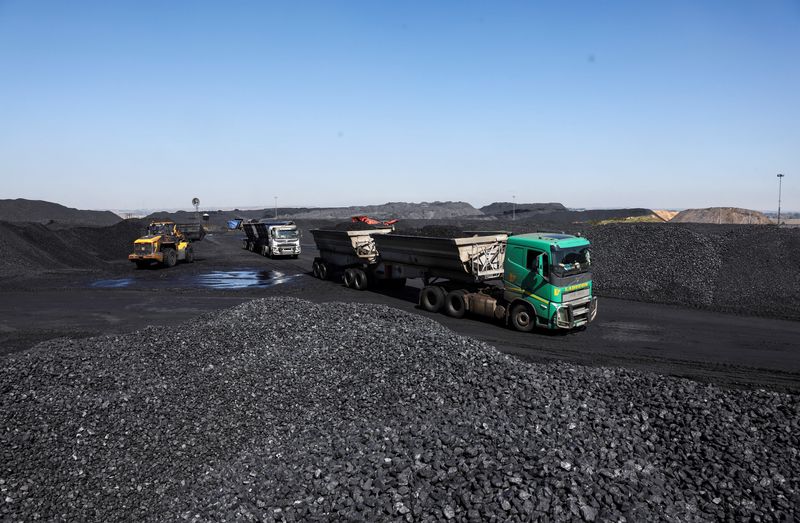By Nelson Banya and Helen Reid
JOHANNESBURG (Reuters) - Mining companies in South Africa have resorted to trucking coal to ports to meet a surge in European demand since the war in Ukraine started, bypassing the deteriorating rail infrastructure they blame for billions of dollars in lost revenue.
Poor maintenance, a lack of spare parts for trains, copper cable theft and vandalism have disrupted state logistics firm Transnet's freight rail services, causing coal and iron ore exports to fall in recent years.
In April, Transnet declared force majeure on contracts with producers but with coal prices near record highs, mining firms including Glencore (OTC:GLNCY) have turned to trucks, one industry source said. A Glencore spokesperson declined to comment.
Trucking coal costs about four times more than rail, according to miner Menar. It has started using trucks but said the high coal prices mean miners can absorb the cost, for now.
"The industry at large are on their knees, so they are resorting to drastic measures," said Clifford Hallatt, chief operating officer at Canyon Coal, a joint venture between Menar and commodity trader Mercuria.
At Canyon Coal's Khanye Colliery some 90 km (55 miles) from Johannesburg, it takes about 80 trucks - each carrying 34 tonnes - to replace one average Transnet train, making it unsustainable financially, boosting emissions and clogging roads.
But the company says it has little choice.
A year ago, it was loading five or six Transnet trains a week from Khanye. That has dropped to just two or three now, and its stockpiles of coal have been mounting, Hallatt said.
COAL PRICES ROCKET
Demand, meanwhile, has shot up since the war in Ukraine. The European Union has announced a ban on Russian coal and mining companies in South Africa say they are fielding calls from European countries looking for imports.
As for prices, Australian thermal coal futures were trading at about $80 a tonne at the start of 2021. A week after Russia sent its forces into Ukraine, they rocketed to a record high of $440 and are now trading at $326 a tonne.
Menar is trucking about 120,000 tonnes of coal a month and plans to increase that to 200,000 tonnes, Hallatt said.
As a whole, South African coal miners are putting about 400 trucks on the road a day, trucking some 6 million tonnes of coal on an annualised basis, according to the industry source.
"We are aware that there's been an increase in the number of coal trucks now running into the ports and that's not a good situation," Transnet Freight Rail Chief Executive Sizakele Mzimela told Reuters.
Transnet shipped 58.3 million tonnes of coal to the Richards Bay Coal Terminal last year, 24% below its annual capacity of 77 million tonnes. Transnet expects an improvement in the delivery of coal this year, to about 60 million tonnes.
But limited rail capacity cost bulk commodity exporters at least 35 billion rand ($2.2 billion) last year in lost revenue, according to South Africa's Minerals Council.
Transnet's Mzimela said the state-owned firm feels the industry's pain.
"The frustration is more about the lost opportunity, because of course if we were able to move more, we would benefit, they would benefit. We are tied at the hip," she said.
Transnet freight rail capacity constraints https://graphics.reuters.com/MINING-INDABA/LOGISTICS/myvmnqwqepr/chart.png
OTHER OPPORTUNITIES?
Mzimela said Transnet was open to miners investing in their own rolling stock, as well as allowing private rail operators to run on some container route slots. But it does not plan to open its iron ore and coal lines to private firms.
That falls short of what mining firms, who are helping to fund private security to combat theft along rail lines, want.
Menar said it was pushing to invest in state-owned rail lines and procure its own locomotives and wagons as part of attempts to overcome the country's infrastructure bottleneck.
Hallatt told Reuters that Menar would also consider operating a section of the bulk commodity rail lines, although that's an option Transnet's Mzimela rejects.
Since the security collaboration started, the number of drones monitoring the coal line from Mpumalanga to Richards Bay has more than doubled and incidents have fallen to about 19 a week from 35 previously, according to Transnet.
The copper cables carrying electricity from substations along the line to signalling systems are regularly stolen, for example, as well as other metal parts along the track.
For the first time, South Africa was ranked among the 10 least attractive jurisdictions for mining investment in the Fraser Institute's annual mining industry survey last year.
Gabrielle Reid, associate director for strategic intelligence at S-RM, said the logistical challenges were now prompting some South African miners to look outside the country for growth opportunities.

"Our most recent experiences with rail in South Africa make for a compelling diversification case," July Ndlovu, chief executive of thermal coal producer Thungela Resources, told analysts on a call in March.
"Given the concentration that we've got in a single geography and the concentrated risk associated with that infrastructure, I think it stands to reason that we should look at other opportunities."